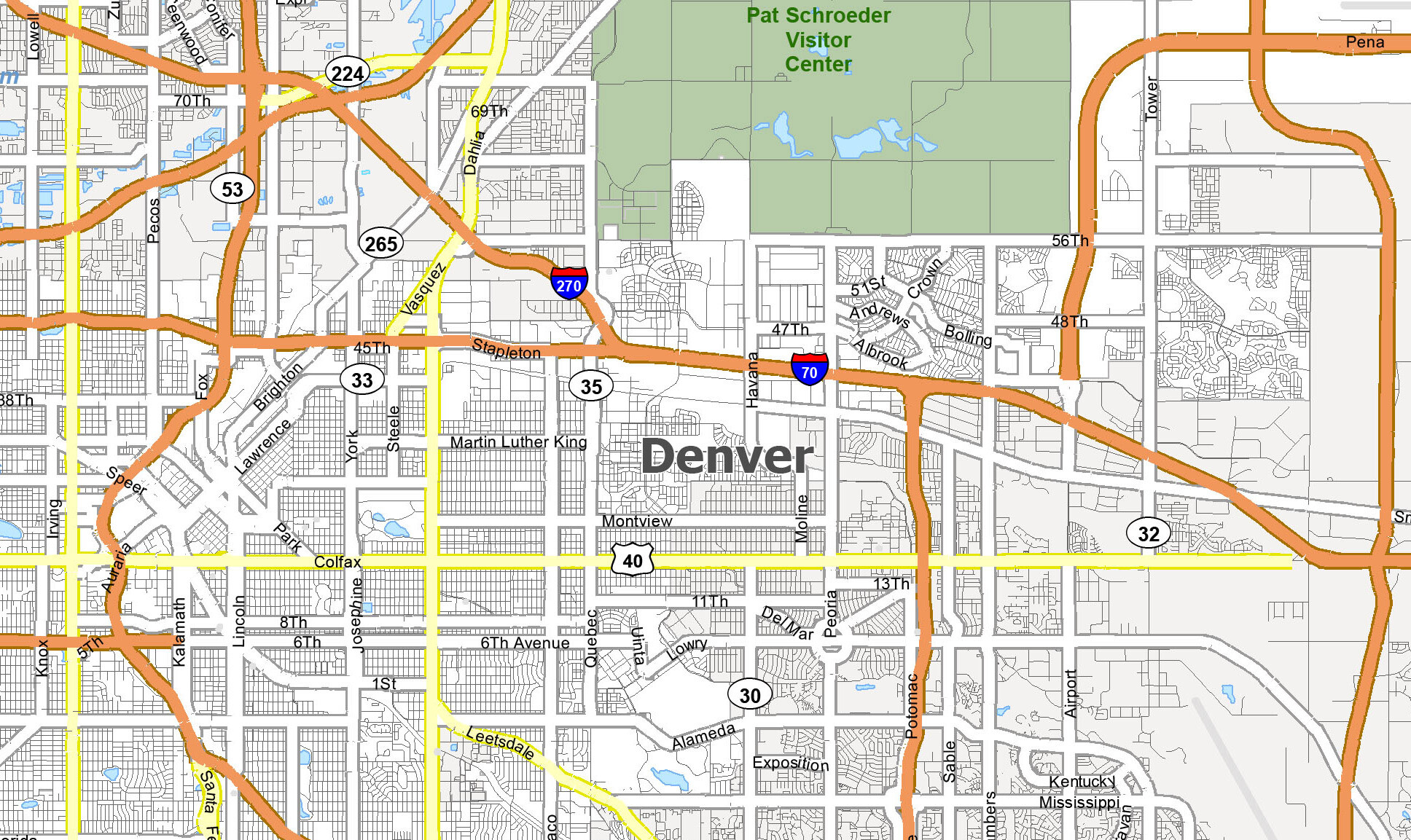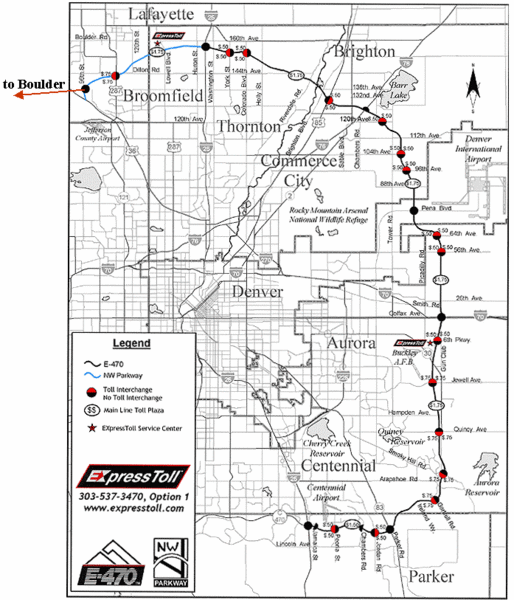Navigating Denver’s Toll Roads: A Comprehensive Guide
Navigating Denver’s Toll Roads: A Comprehensive Guide
Related Articles: Navigating Denver’s Toll Roads: A Comprehensive Guide
Introduction
With enthusiasm, let’s navigate through the intriguing topic related to Navigating Denver’s Toll Roads: A Comprehensive Guide. Let’s weave interesting information and offer fresh perspectives to the readers.
Table of Content
Navigating Denver’s Toll Roads: A Comprehensive Guide

Denver’s expansive road network, a testament to its growth and bustling urban life, incorporates a system of toll roads designed to enhance traffic flow and fund infrastructure improvements. Understanding this system is crucial for navigating the city efficiently and cost-effectively. This comprehensive guide provides a detailed overview of Denver’s toll roads, encompassing their locations, payment methods, and associated benefits, aiming to equip drivers with the knowledge needed to confidently traverse the city’s thoroughfares.
The Denver Toll Road Network: A Detailed Look
Denver’s toll road network primarily comprises the following:
- E-470: This 47-mile, limited-access highway encircles the eastern and southern portions of the Denver metropolitan area. It serves as a vital bypass route for Interstate 25 (I-25) and Interstate 70 (I-70), offering a quicker and smoother alternative for long-distance travel.
- C-470: This 47-mile, limited-access highway encircles the western and southern portions of the Denver metropolitan area. Similar to E-470, it serves as a vital bypass route for I-25 and I-70, providing a more efficient route for local and regional travel.
- Peabody Toll Road: This 10-mile stretch of toll road connects I-25 to I-70 in the Denver metropolitan area. It plays a crucial role in alleviating traffic congestion on I-25, particularly during peak hours.
Payment Methods: Ensuring Smooth Transitions
Denver’s toll roads offer a variety of payment methods, providing flexibility and convenience for drivers:
- Electronic Toll Collection (ETC): Utilizing transponders, such as the ExpressToll pass, allows for automatic toll payment as drivers pass through toll plazas. This method offers the most convenient and efficient option, eliminating the need to stop and pay manually.
- Manual Payment: Drivers without ETC transponders can pay tolls manually at toll booths using cash, credit cards, or debit cards. This method requires stopping at toll plazas, potentially causing delays during peak hours.
- Online Payment: Drivers can also pay tolls online through the ExpressToll website or mobile app. This option is ideal for those who have already passed through a toll plaza and need to settle their toll charges later.
Benefits of Denver’s Toll Roads: A Multifaceted Approach
Denver’s toll road system provides several benefits to the city and its residents:
- Reduced Traffic Congestion: By offering alternative routes and providing financial incentives for drivers to use less congested highways, toll roads effectively alleviate traffic congestion on major arteries. This leads to faster travel times and reduced stress for commuters.
- Improved Safety: Toll roads are typically designed with enhanced safety features, such as wider lanes, clear signage, and reduced access points. This contributes to a safer driving environment, minimizing the risk of accidents and promoting smoother traffic flow.
- Funding Infrastructure Improvements: Toll revenue plays a crucial role in funding the maintenance and expansion of transportation infrastructure within the Denver metropolitan area. This ensures a robust and well-maintained road network, supporting economic growth and enhancing the overall quality of life for residents.
- Environmental Benefits: By encouraging drivers to use less congested highways, toll roads contribute to reduced fuel consumption and greenhouse gas emissions. This aligns with environmental sustainability goals and contributes to a cleaner and healthier environment.
Navigating Denver’s Toll Roads: A Practical Guide
To ensure a smooth and efficient driving experience on Denver’s toll roads, consider the following tips:
- Obtain an ExpressToll Pass: Utilizing an ETC transponder offers the most convenient and efficient method for paying tolls. It eliminates the need to stop at toll plazas and ensures seamless passage through toll points.
- Plan Your Route: Familiarize yourself with the toll road network, considering your destination and desired route. Utilize online mapping services or consult with local resources for the most efficient path.
- Check Toll Rates: Be aware of the toll rates associated with the specific toll roads you plan to use. This information is readily available online through the ExpressToll website or other transportation resources.
- Budget for Tolls: Factor toll costs into your travel budget, particularly for longer journeys or frequent toll road usage. This ensures a more accurate assessment of your overall travel expenses.
- Stay Informed: Keep up-to-date with any changes or announcements regarding toll rates, payment methods, or construction projects that may impact your travel plans.
Frequently Asked Questions (FAQs) about Denver’s Toll Roads
Q: What are the toll rates for Denver’s toll roads?
A: Toll rates vary depending on the specific toll road, time of day, and vehicle type. You can find the most up-to-date toll rates on the ExpressToll website or by contacting the ExpressToll customer service line.
Q: How can I obtain an ExpressToll Pass?
A: ExpressToll passes can be purchased online through the ExpressToll website, at participating retail locations, or by calling the ExpressToll customer service line.
Q: What are the benefits of using an ExpressToll Pass?
A: Using an ExpressToll Pass allows for automatic toll payment, eliminating the need to stop at toll plazas and ensuring a seamless driving experience. It also offers potential discounts and other benefits.
Q: Are there any discounts or exemptions available for toll roads?
A: Some discounts and exemptions may be available for certain vehicle types, such as motorcycles, or for frequent users of toll roads. Check the ExpressToll website or contact customer service for details.
Q: What happens if I don’t pay a toll?
A: If you fail to pay a toll, you will receive a violation notice in the mail. You can pay the toll online or by mail within a specified timeframe. Failure to pay may result in fines and penalties.
Conclusion: A Seamless and Efficient Travel Experience
Denver’s toll road network plays a vital role in managing traffic flow, funding essential infrastructure improvements, and enhancing the overall transportation experience for residents and visitors alike. By understanding the network, payment methods, and associated benefits, drivers can navigate the city’s roadways efficiently and cost-effectively, contributing to a smoother and more enjoyable travel experience. Whether commuting daily or exploring the vibrant metropolis, a thorough understanding of Denver’s toll roads empowers drivers to make informed choices, maximizing their time and minimizing their expenses.








Closure
Thus, we hope this article has provided valuable insights into Navigating Denver’s Toll Roads: A Comprehensive Guide. We thank you for taking the time to read this article. See you in our next article!
You may also like
Recent Posts
- Navigating The Tapestry Of Singapore: A Comprehensive Guide To Its Districts
- A Comprehensive Guide To The Nangarhar Province Map: Unveiling The Heart Of Eastern Afghanistan
- Navigating The Hub Of The Heartland: A Comprehensive Guide To Kansas City International Airport
- Navigating The Tapestry Of Brooklyn: A Comprehensive Guide To The Borough’s Map
- Navigating The Landscape: A Comprehensive Guide To The Linden, Tennessee Map
- Navigating Brussels Airport: A Comprehensive Guide To The Brussels Airport Map
- Navigating The Beauty Of Caesar’s Creek: A Comprehensive Guide To The Map
- Navigating California’s Natural Wonders: A Comprehensive Guide To State Park Campgrounds
Leave a Reply